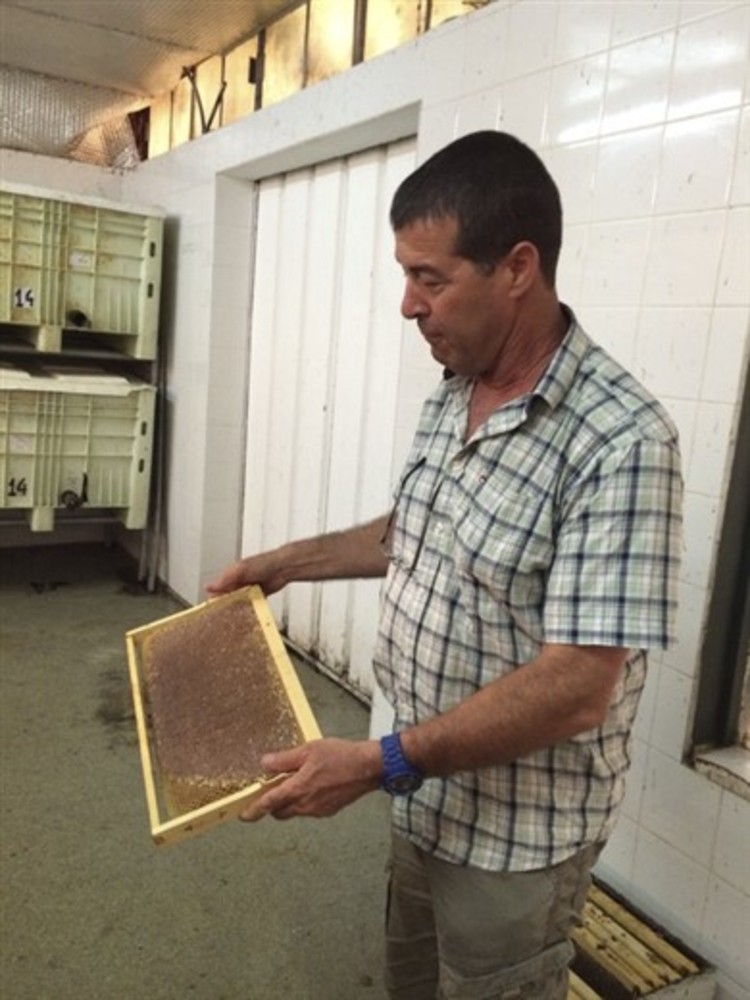A sweet new year for Israel’s bees
 Yuval Lin, owner of Lin’s Bee Farm in central Israel.
Yuval Lin, owner of Lin’s Bee Farm in central Israel.
JNS.org
Bees have suddenly become the buzzword of doom, as their population internationally has plummeted and the effects on commercial agriculture has become a serious concern.
In just one year, American beekeepers lost an estimated 42 percent of their colonies, a staggering amount in an agricultural system already struggling to meet demand. With bee activities having an impact on the American economy of roughly $15 billion annually, scientists and politicians alike have started to take notice. Together with the drought in California threatening almond orchards (local bees’ main source of food), the increasing trend toward using cloned plants that provide very little nutrition to bees, and the continued use of strong pesticides, the U.S. and the rest of the Western world seem to be standing on the precipice of a full-blown bee crisis, which could lead to low-quality produce and food shortages.
Israel, on the other hand, anticipated these consequences years ago.
“We understand the danger, we understand all the implications, that this affects the quality of food,” says Yuval Lin, owner of Lin’s Bee Farm in Kfar Bilu in central Israel.
Fifteen years ago, Israel was quickly urbanizing at the expense of the diverse trees and plants that provided their bees with food and helped them produce high-quality honey. Lin and other beekeepers recognized that a process was beginning that could cause significant damage to their bee colonies. In the hopes of minimizing potential damage, they approached Jewish National Fund (JNF) to ask for help with acquiring nectar-producing plants that could sustain bee populations around the country year-round.
Sitting in front of a window that is stacked with hives and swarming with bees, Lin recalls, “I started beekeeping as a hobby when I was 16; now it’s a family farm.” Today, on the cusp of Rosh Hashanah, a holiday in which honey is a traditional staple that represents hope for a sweet new year, he is not worried about being able to meet peak demands. By introducing hearty nectar-producing plants and trees across Israel, especially eucalyptus trees imported from Australia, JNF and the beekeepers it works with have been able to keep Israel’s bee population in good health, even as the rest of the Western world frets about a looming agricultural crisis as a consequence of their loss of bees over the last few years.
While other countries’ bees suffer from a lack of horticultural diversity, which shortens the amount of time that food is available to them, Israel’s wide variety of eucalyptus species – which flower in different seasons – offers bees a continuous and rich source of food year-round.
Israel is a small country, so when it comes to protecting agricultural endeavors, the story is one of collaboration, not competition. With roughly 500 beekeepers caring for about 100,000 beehives, the Israeli beekeeping community is small and dedicated to supporting each other. In Kfar Bilu alone, there are three beekeepers, and they have worked together to encourage residents to plant nectar-producing species, especially eucalyptus, around their homes and the open areas, improving the neighborhood’s aesthetics and the bees’ ability to find food year-round.
The Israeli program of strategically introducing nectar-producing plants is garnering international attention. JNF has produced a free guidebook for Israeli beekeepers and farmers on nectarous plants, with pictures and short descriptions of the hundreds of species. Due to requests from farmers around the world, this guidebook will soon be translated into English. JNF even recently received a phone call from a farmer in India requesting seven species to try out himself.
Nudging the Israeli government to see eucalyptus trees as a solution and not as a nuisance or invasive species has required considerable effort and education. The first and most common species that was introduced to Israel, even before the founding of the state in 1948, propagated too fast and encroached on wetlands. Its large size also meant that it damaged passing trains and often fell onto train tracks, thereby forcing the national railway to spend a significant amount of time and money trying to keep the trees under control. But efforts have paid off, and today when the national railway builds a new line, or when the highway infrastructure is expanded, JNF is consulted about planting smaller varieties of eucalyptus species along the route to beautify the view for commuters and counteract some of the de-forestation that takes place to allow such developments.
Fifteen years ago, beekeepers globally struggled to get anybody to care about the impending crisis. Suddenly, in the last couple of years, colony depletion has been splashed across the headlines, and the world has started to worry that the future of humanity could be in jeopardy. In Israel, the positive impact of long-term vision and creative ecological solutions has been felt for years.
“Ten years ago I spoke with a beekeeper and he told me, ‘You revolutionized things for us,’” says Aviv Eisenband, director of JNF’s Forestry and Professional Department.
Today, an average of 200,000 eucalyptus trees, in addition to other nectar-producing plants, is planted each year, according to Eisenband.
“We do it so that farmers like Yuval will be able to support themselves,” he says. “With this program, JNF will grow and enrich the environment and increase the amount of open land.”
Sweet news indeed for Israelis and their local bees.







